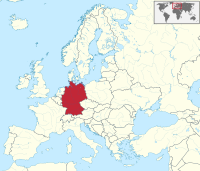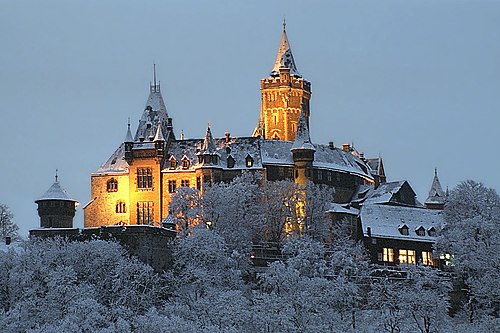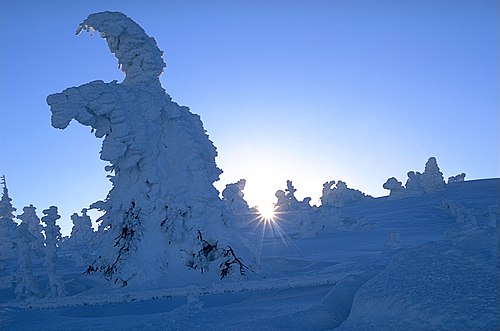Portal:Germany
Welcome to the Germany Portal!
Willkommen im Deutschland-Portal!

|

|

| |
Germany (German: Deutschland), officially the Federal Republic of Germany, is a country in Central and Western Europe, lying between the Baltic and North Sea to the north and the Alps to the south. It borders Denmark to the north, Poland and the Czech Republic to the east, Austria and Switzerland to the south, France to the southwest, and Luxembourg, Belgium and the Netherlands to the west.
Germany includes 16 constituent states, covers an area of 357,596 square kilometres (138,069 sq mi) and has a largely temperate seasonal climate. With nearly 83 million inhabitants, it is the second most populous state of Europe after Russia, the most populous state lying entirely in Europe, as well as the most populous member state of the European Union. Germany is a very decentralized country. Its capital and most populous city is Berlin, while Frankfurt serves as its financial capital and has the country's busiest airport.
In 1871, Germany became a nation-state when most of the German states unified into the Prussian-dominated German Empire. After World War I and the Revolution of 1918–19, the empire was replaced by the parliamentary Weimar Republic. The Nazi seizure of power in 1933 led to World War II, and the Holocaust. After the end of World War II in Europe and a period of Allied occupation, two new German states were founded: West Germany, formed from the American, British, and French occupation zones, and East Germany, formed from the western part of the Soviet occupation zone, reduced by the newly established Oder-Neisse line. Following the Revolutions of 1989 that ended communist rule in Central and Eastern Europe, the country was reunified on 3 October 1990.
Germany is a federal parliamentary republic led by a chancellor. It is a great power with a strong economy. The Federal Republic of Germany was a founding member of the European Economic Community in 1957 and the European Union in 1993. Read more...
Selected article

Michael Schumacher (German pronunciation: [ˈmɪçaːʔeːl ˈʃuːmaxɐ]; born 3 January 1969) is a German former racing driver, who competed in Formula One from 1991 to 2006 and from 2010 to 2012. Schumacher won a record-setting seven Formula One World Drivers' Championship titles, tied by Lewis Hamilton in 2020, and—at the time of his retirement—held the records for most wins (91), pole positions (68), and podium finishes (155), while he maintains the record for most fastest laps (77), among others.
Born in Hürth to a working-class family, Schumacher started his career in kart racing aged four. He won his first karting title two years later in a kart built from discarded parts. After having enjoyed success in karting—such as winning the direct-drive Karting European Championship in 1987—and in several single-seater series, Schumacher made a one-off Formula One appearance with Jordan at the 1991 Belgian Grand Prix. He was signed by Benetton for the rest of the 1991 season, winning his first and second drivers' titles consecutively in 1994 and 1995 with the team. Schumacher moved to the struggling Ferrari team in 1996. During his first few years with the team, Schumacher lost out on the title in the final race of the season in 1997 and 1998, and suffered a broken leg from a brake failure in 1999. He and Ferrari won five consecutive titles from 2000 to 2004, including unprecedented sixth and seventh titles, while breaking several records. After finishing third in 2005 and second in 2006, Schumacher retired from the sport, although he later made a brief return with Mercedes from 2010 to 2012. (Full article...)
Selected picture
Related portals
- Parent portals
- Regional
- History
 Holy Roman Empire (900–1806)
Holy Roman Empire (900–1806) East Germany (1949–1990)
East Germany (1949–1990)
- Neighbouring countries
Anniversaries for March 4

- 1152 - Frederick I Barbarossa is elected King of the Germans.
- 1793 - Birth of philologist and critic Karl Lachmann
- 1879 - Birth of Bernhard Kellermann (pictured), author of Der Tunnel
- 1936 - First flight of zeppelin LZ 129 Hindenburg, one of the two largest flying crafts every built
- 1941 - Death of pacifist Ludwig Quidde, recipient of the 1927 Nobel Peace Prize
Did you know...
- ... that Hans Dieter Beck (pictured), a co-head of the publisher C. H. Beck, rode a bicycle to work until he was 92?
- ... that John Beaglehole described the appointment of Johann Reinhold Forster as naturalist on Cook's second voyage as "one of the Admiralty's vast mistakes"?
- ... that Maria Einsmann claimed to be her own husband, Josef, when she registered the births of her companion Helene Müller's two children in 1921 and 1930?
- ... that Theresia Bauer was named science minister of the year four times?
- ... that while Germans murdered millions of prisoners of war during WWII, the survival ratio of Jewish POWs was generally tied to the army or nation they served with, and not to their ethnicity?
- ... that on 26 December 1724 J. S. Bach directed the first performance of Christum wir sollen loben schon, BWV 121, based on a hymn written by Martin Luther in 1524?
- ... that the main cemetery of Mainz was established in 1803 and became the model for the Cimetière du Père-Lachaise in Paris?
- ... that German-born physician Pablo Busch (pictured) was labelled a "witch or curandero" by indigenous tribes in Bolivia?
Selected cuisines, dishes and foods

Sauerbraten (pronounced [ˈzaʊ̯ɐˌbʁaːtn̩] ⓘ) is a traditional German roast of heavily marinated meat. It is regarded as a national dish of Germany, and is frequently served in German-style restaurants internationally. It can be cooked from a variety of meats, most often from beef, but also from chicken, lamb and mutton, pork and horse. Before cooking, the raw meat is marinated for 5 to 15 days in a mixture of wine or vinegar, water, herbs, spices, and seasonings. Usually, tougher cuts of meat, such as rump roast or bottom round of beef, are used, and the long marinating tenderizes the meat. A Sauerbraten dinner is almost always accompanied by a hearty gravy resulting from its roasting and is most often served with potato pancakes (Kartoffelpuffer), potato dumplings (Kartoffelklöße), or Spätzle.
Ingredients used in the marinade, and accompaniments served with sauerbraten, vary across regions. Regional variants of the dish include those from Baden, Franconia, Thuringia, Rhineland, Saarland, Silesia, and Swabia. (Full article...)Topics
Categories
Things you can do

A list of articles needing cleanup associated with this project is available. See also the tool's wiki page and the index of WikiProjects.
Here are some tasks you can do. Please remove completed tasks from the list.
- Requests: German Archaeological Institute at Rome, Deutsche Familienversicherung, Dietlof von Arnim-Boitzenburg, Rolf von Bargen, Hennes Bender, Eduard Georg von Bethusy-Huc, Rolf Brandt (1886–1953), Jan Philipp Burgard, Lisa Feller, Georg Arbogast von und zu Franckenstein, Georg Gafron, Ferdinand Heribert von Galen, Gundula Gause, Karl-Heinz Hagen, Herbert Helmrich, Nils von der Heyde, Monty Jacobs (1875–1945), , Siegfried Kauder, Matze Knop, Wolfgang Kryszohn, Claus Larass, Isidor Levy (1852–1929), Markus Löning, Tobias Mann, Mathias Müller von Blumencron ,Günther Nonnenmacher Anke Plättner, Hans Heinrich X. Fürst von Pless, Gerd Poppe, Victor-Emanuel Preusker, Günter Prinz, Ulrich Reitz, Hans Sauer (inventor), Franz August Schenk von Stauffenberg, Paul Schlesinger (1878-1928), Hajo Schumacher, Otto Theodor von Seydewitz, Christoph Sieber (comedian), Dorothea Siems, Werner Sonne, Udo zu Stolberg-Wernigerode, Christoph Strässer, Joseph von Utzschneider, Jürgen Wieshoff, Hans Wilhelmi, Dietmar Wischmeyer, Alexandra Würzbach
- Unreferenced: Unreferenced BLPs, Bundesautobahn 93, Benjamin Trinks, Steeler (German band), Amelie Beese, Zoologisches Museum in Kiel, Emil Krebs, Prussian semaphore system, Partenstein, Peter Krieg, Porsche 597, Christa Bauch, Curt Cress, Stefan Beuse
- Cleanup: 53541 issues in total as of 2024-03-03
- Translate: Articles needing translation from German Wikipedia
- Stubs: Albersdorf, Thuringia, Ingo Friedrich, Berndt Seite, Federal Social Court; 117 articles in Category:German MEP stubs
- Update: Deutsches Wörterbuch
- Portal maintenance: Update News, Did you know, announcements and the todo list
- Orphans:
Orphaned articles in Germany

- Photo: Take/Add requested photographs
- Help assess the quality of 898 unassessed articles
Associated Wikimedia
The following Wikimedia Foundation sister projects provide more on this subject:
-
Commons
Free media repository -
Wikibooks
Free textbooks and manuals -
Wikidata
Free knowledge base -
Wikinews
Free-content news -
Wikiquote
Collection of quotations -
Wikisource
Free-content library -
Wikiversity
Free learning tools -
Wikivoyage
Free travel guide -
Wiktionary
Dictionary and thesaurus













































